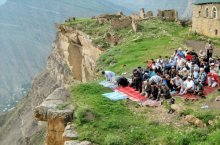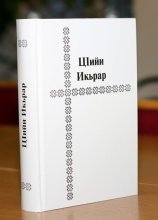 By the middle of the 1st millennium B.C., an alliance of 26 tribes was formed in the eastern Transcaucasus (at present, the territory of Azerbaijan). They formed the polyethnic kingdom of Caucasian Albania, which in the 4th century A.D. adopted Christianity as its state religion. Parts of the Bible were translated into the Caucasian Albanian, or Agwan, language, which belonged to the Lezgic language family. However, this translation was lost during the early Medieval period, and parts of it were discovered only in recent times. In the 12-17th centuries Islam came to dominate in the region, so nowadays the Lezgic peoples are mainly Muslim. They practice folk Islam, but traces of their Christian past are still noticeable, and in folklore traditions one can still find traces of ancient paganism.
By the middle of the 1st millennium B.C., an alliance of 26 tribes was formed in the eastern Transcaucasus (at present, the territory of Azerbaijan). They formed the polyethnic kingdom of Caucasian Albania, which in the 4th century A.D. adopted Christianity as its state religion. Parts of the Bible were translated into the Caucasian Albanian, or Agwan, language, which belonged to the Lezgic language family. However, this translation was lost during the early Medieval period, and parts of it were discovered only in recent times. In the 12-17th centuries Islam came to dominate in the region, so nowadays the Lezgic peoples are mainly Muslim. They practice folk Islam, but traces of their Christian past are still noticeable, and in folklore traditions one can still find traces of ancient paganism.
It was a long-cherished IBT plan to translate the full Bible into one of the 10 contemporary languages belonging to the Lezgic group, and the recent Lezgi NT publication has become a decisive step towards the fulfilment of this dream. The project’s translation consultant, Marianne Beerle-Moor, felt drawn to the Lezgi people and language 40 years ago, when she undertook her first sight-seeing trip to Moscow at the end of 1970s (any other trips except as a tourist were impossible for a Swiss citizen in Soviet times). In the course of that trip, Marianne found a small grammar of the Lezgi language in a bookstore. For anybody else, such a random find would have had no consequences at all, but Marianne was a linguist with a special interest in Caucasian languages, and therefore that little book was like a sign that illuminated her further path. Thus she embarked on a journey that she describes as “an adventure”. And the adventure became life-long. Marianne proceeded to defend her doctoral dissertation on the Lezgi verb with the purpose of becoming an exegete for the Lezgi Bible translation project, but many more events followed and she had to start from the opposite end, heading up the whole Institute for Bible Translation in Moscow from 1997 to 2013. But that’s already a different story, so let’s plunge into the Lezgi project at its current stage of development.
found a small grammar of the Lezgi language in a bookstore. For anybody else, such a random find would have had no consequences at all, but Marianne was a linguist with a special interest in Caucasian languages, and therefore that little book was like a sign that illuminated her further path. Thus she embarked on a journey that she describes as “an adventure”. And the adventure became life-long. Marianne proceeded to defend her doctoral dissertation on the Lezgi verb with the purpose of becoming an exegete for the Lezgi Bible translation project, but many more events followed and she had to start from the opposite end, heading up the whole Institute for Bible Translation in Moscow from 1997 to 2013. But that’s already a different story, so let’s plunge into the Lezgi project at its current stage of development.
The Lezgi translation team now consists of three mother tongue translators, an exegete from Germany, and a field-tester. One of the translators is a gifted poet, who endeavours to reveal the poetic style in the original and render it in his translation. One episode from the history of the Lezgi Bible translation project is related to our poet and is worth sharing. Once, the above-mentioned Lezgi translator decided to leave the project, but the team didn’t want to lose his input and partnership. They started begging him to continue. “There are still so many untranslated poetic texts in the Bible; we won’t manage without you,” they complained, and to illustrate the point they nam ed the Book of Psalms. He asked for a Hebrew audio of Psalms in order to make his own conclusion, whether they were really poetic. At that moment in the project’s history there was still no plan to start translating Psalms, but the team found the requested audio and gave it to their colleague. He took his time to listen to the melody of the unknown ancient language and then summed up briefly, “I’ve caught the idea how to translate the Psalms.” The immediate result was that he stayed in the project and everyone else heaved a sigh of relief. Nobody expected any other continuation. According to the IBT translation approach, translators don’t receive any further task until the exegete prepares the translator for the Bible book that is planned for translation. So what a shock it was for the Lezgi exegete when one day the above-mentioned translator-poet came up to him and said, “I’ve finished translating the Psalms.” No plan! No preparation! The melody of Hebrew speech itself became the needed “introduction” for the poet-translator to start doing his work. He didn’t need anything else. Even more surprising was that when the exegete read through this spontaneous translation, he was satisfied with its quality. Of course, the text was still at the 1st draft stage, with all other stages of editing ahead, but the fact remains that the Psalms were translated into Lezgi in a most unusual way, as if a modern poet heard his ancient brother calling him through the centuries, regardless of cultural and linguistic barriers.
ed the Book of Psalms. He asked for a Hebrew audio of Psalms in order to make his own conclusion, whether they were really poetic. At that moment in the project’s history there was still no plan to start translating Psalms, but the team found the requested audio and gave it to their colleague. He took his time to listen to the melody of the unknown ancient language and then summed up briefly, “I’ve caught the idea how to translate the Psalms.” The immediate result was that he stayed in the project and everyone else heaved a sigh of relief. Nobody expected any other continuation. According to the IBT translation approach, translators don’t receive any further task until the exegete prepares the translator for the Bible book that is planned for translation. So what a shock it was for the Lezgi exegete when one day the above-mentioned translator-poet came up to him and said, “I’ve finished translating the Psalms.” No plan! No preparation! The melody of Hebrew speech itself became the needed “introduction” for the poet-translator to start doing his work. He didn’t need anything else. Even more surprising was that when the exegete read through this spontaneous translation, he was satisfied with its quality. Of course, the text was still at the 1st draft stage, with all other stages of editing ahead, but the fact remains that the Psalms were translated into Lezgi in a most unusual way, as if a modern poet heard his ancient brother calling him through the centuries, regardless of cultural and linguistic barriers.
Now the translator of the Psalms hopes that several Psalms can be printed in the old Caucasian Albanian script, which was deciphered by linguists at the very end of the 20th century and digitalised in Unicode several years ago. This “re-birth” of the Caucasian Albanian alphabet reverberated in the hearts of the Lezgi team members. Discovering the alphabet of their ancestors, one as ancient as the Georgian and Armenian alphabets, gave indisputable evidence of the ancient roots of the Lezgi people. It also gave new depth to the Bible translation project because of the Biblical fragments that the deciphered Caucasian Albanian manuscripts contained.
 The project coordinator, who is also the exegete, is a native German and an engineer in his first profession. He draws all the project plans in the form of graphs, where he highlights in percentages and different colors how much has been done and how much remains to do in the project. His precise approach contrasts with typical life in Dagestan, where planning is altogether uncustomary. People in the rather patriarchal Lezgi society have a very different attitude towards time. They have other priorities: human relationships, including one’s duty towards relatives and friends, are always in first place, while work comes second. That’s why translation work can hardly progress as rapidly as planned. However, with human relations being a priority, it was always an evident goal for the Lezgi project team to make the text of the Lezgi Bible clear to speakers of Lezgi who live in a different linguistic situation than the translation team, who speak the literary dialect. Thus, the translated texts are meant also for Lezgis in Azerbaijan, where their mother tongue exists primarily in oral form and is developing somewhat differently from the Dagestanian dialect. Azerbaijani Lezgis are more aware of the many Turkic borrowings in the language and try to find authentic Lezgi renderings. Being bilingual, they easily distinguish between Azeri and Lezgi words and try to guard the purity of their mother tongue. As a result, all the Bible texts translated by the IBT team were additionally field-tested among the Lezgis of Azerbaijan. In order to achieve this, two Lezgi Christian women from Azerbaijan joined the project as external reviewers. They initiated reading meetings in Baku, so that Lezgi believers in Azerbaijani churches would embrace this translation as the Bible they want to read. An atmosphere of mutual respect developed between them and the translators. High linguistic professionalism, on the one hand, and deep knowledge of the Bible on the other have formed a solid platform for mutual enrichment and collaboration.
The project coordinator, who is also the exegete, is a native German and an engineer in his first profession. He draws all the project plans in the form of graphs, where he highlights in percentages and different colors how much has been done and how much remains to do in the project. His precise approach contrasts with typical life in Dagestan, where planning is altogether uncustomary. People in the rather patriarchal Lezgi society have a very different attitude towards time. They have other priorities: human relationships, including one’s duty towards relatives and friends, are always in first place, while work comes second. That’s why translation work can hardly progress as rapidly as planned. However, with human relations being a priority, it was always an evident goal for the Lezgi project team to make the text of the Lezgi Bible clear to speakers of Lezgi who live in a different linguistic situation than the translation team, who speak the literary dialect. Thus, the translated texts are meant also for Lezgis in Azerbaijan, where their mother tongue exists primarily in oral form and is developing somewhat differently from the Dagestanian dialect. Azerbaijani Lezgis are more aware of the many Turkic borrowings in the language and try to find authentic Lezgi renderings. Being bilingual, they easily distinguish between Azeri and Lezgi words and try to guard the purity of their mother tongue. As a result, all the Bible texts translated by the IBT team were additionally field-tested among the Lezgis of Azerbaijan. In order to achieve this, two Lezgi Christian women from Azerbaijan joined the project as external reviewers. They initiated reading meetings in Baku, so that Lezgi believers in Azerbaijani churches would embrace this translation as the Bible they want to read. An atmosphere of mutual respect developed between them and the translators. High linguistic professionalism, on the one hand, and deep knowledge of the Bible on the other have formed a solid platform for mutual enrichment and collaboration.
It’s not a quick process, but the half-way mark has now been achieved: the Lezgi New Testament has now been published.
We would greatly appreciate your financial assistance towards this project.
If you prefer to send your donation through a forwarding agent in the U.S. or Europe,
please write to us and we'll provide the details of how this can be done.

Share: